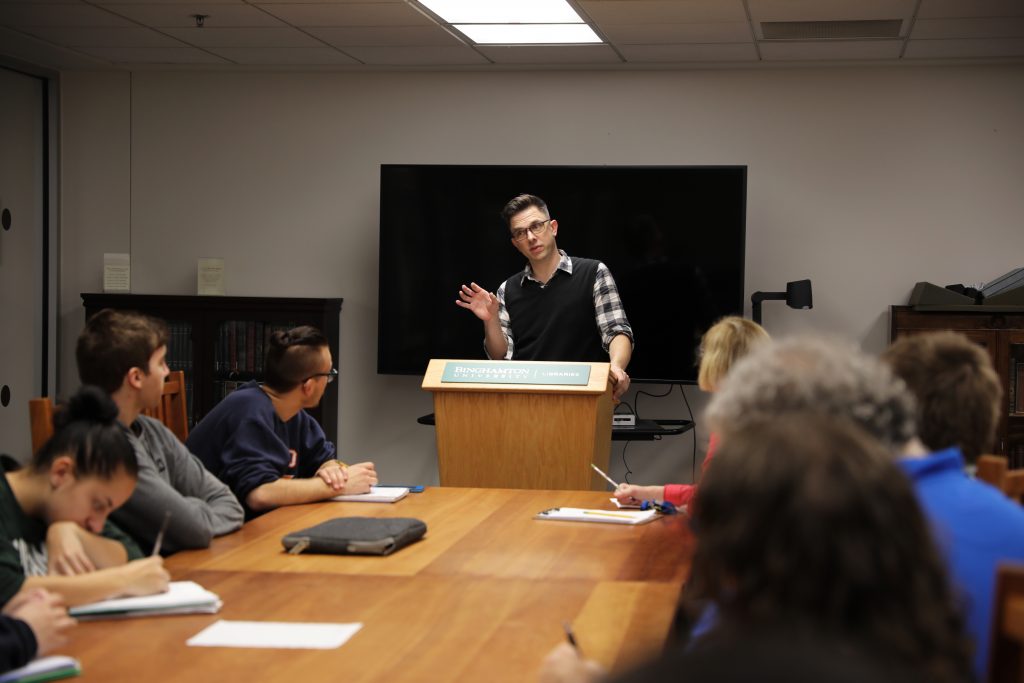Even 150 years after poet Walt Whitman wrote most of his works, his words are still being discussed at Binghamton University.
BU Libraries’ Special Collections hosted a talk on Thursday by Robert Wilson, an adjunct lecturer of English, titled “Singing the Body Electric: Opera, Democracy and Voice in the Poetry of Walt Whitman.”
The talk focused on Whitman’s connections to opera throughout his life, spanning from his time as a journalist who reviewed theatre to his career as a poet, where he drew inspiration from art. Wilson said Whitman’s concept of “vocalism,” the human ability to communicate through speech, developed from this connection.
“The voice is, for Whitman, the means by which to actualize the ‘life’ in life, in poetry,” he said. “He would be immersed, he would feel himself in this sort of chaotic, vibrant, busy life of the city. ‘Vocalism,’ as he calls it, is a way of feeling oneself ‘feeling.’ To vocalize the poetry is to feel it in your body. And that kind of embodied resonance, I think, was very important to his understanding of what poetry is supposed to be.”
Wilson’s talk was part of Special Collections’ exhibition, titled “Leaves of Grass: Walt Whitman’s Masterwork,” centered around a first edition of Whitman’s poetry collection. The collection was recently gifted to the University from the libraries of C. Mossman McLean, a Binghamton businessman who ran McLean’s Department Store. The multimedia exhibition will be available for viewing until Oct. 15.
Blythe Roveland-Brenton, head of Special Collections, said the talk and the showcase itself was a way to increase the presence of the library branch on campus and in the minds of students.
“I wanted to build more than just the exhibit[ion], to have interaction and have folks come and see it in different ways,” Roveland-Brenton said. “It’s really important to me that people know about Special Collections, especially students, the richness of it, the diverse nature and know that it’s here for them to come and use. It’s not some kind of a vault where we keep precious items and just take them out occasionally — they’re here to be used. I want to draw lots of different audiences.”
Students and faculty alike attended the event, which was open to all and took place in the Bernard F. Huppé Reading Room.
Laura DeLuca, a sophomore majoring in English, attended the event to learn about Walt Whitman and think of him in a way she had never considered before, and said she was excited to see so many people in attendance.
“Having a professor come in and make these unique connections with opera, democracy and Whitman — it’s providing not only students, but professors, teaching assistants, random observers, with a unique perspective on knowledge,” DeLuca said. “A lot of people have some exposure to new ideas they would have never even thought about.”
James Fitz Gerald, an instructor of English and a fourth-year Ph.D. student studying English, cites “Leaves of Grass” as an impetus to his passion for literature. He said he was in attendance at the talk to reacquaint himself with Whitman’s work and learn something new.
“I found a ‘Death-Bed’ edition in my high school library, and that was a very informative moment for me,” Fitz Gerald said. “I study 20th-century literature and culture, so I’ve departed from my origins with Whitman and 19th-century literature, which is part of why I’m here now. As far as vocalism goes, I am a novice in sound studies, so that’s part of why I’m here too. Bob [Wilson] has been really helpful in helping me to think about the other senses.”
After Wilson’s speech, attendees were able to see the first edition collection in the University’s possession. DeLuca said the speech impacted how she saw the collection.
“Professor Wilson is very eloquent, and he has this ability to pack so much meaning into such few words,” DeLuca said. “His connection with opera and democracy in Whitman is something I would probably have never pieced together and most of the people in that room never thought of, but it works. I thought it was incredible.”



